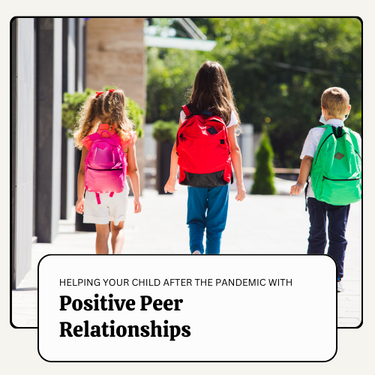
Many parents are concerned that their child or teen has become more isolated due to the pandemic, leading to a reluctance to form and maintain friendships with kids their age. When many of their child's extra-curricular activities were suspended or cancelled during the pandemic, along with a decrease in birthday parties and sleep-overs, and "play dates," parents found it challenging to encourage their child's social skills and connection with peers.
The COVID-19 pandemic impacted almost everyone in some way, including children. Kids had to deal with big changes when the pandemic first hit. Most of them had to switch to virtual schooling options. Others had to give up sports and extracurricular activities. Many couldn’t see or spend time with their friends in person.
Now that things are getting back to normal, schools are back to in-person learning, even if they have precautions in place.
But, after over a year of recommended social distancing and virtual connections, it can be hard for kids to develop positive peer relationships on their own.
So, what can you do, as a parent, to empower them? How can you encourage those strong relationships even as we continue post-pandemic?
Be a Positive Role Model
Your children model and mimic what they see you do on a regular basis—even when it doesn’t seem like it. If you want to empower them to develop positive peer relationships, show them what that looks like.
Be positive and professional with your own peers. That includes people you work with, your friends, and even other family members. You can get together for playdates with your child’s classmates outside of school and show them how positive relationships look. Interact with other parents and be a role model for how your child should act.
Focus on the Positive
You don’t need to keep things hidden from your child. They should absolutely be aware of continued safety precautions and why they are in place. They should understand the rules of their school and how to stay safe while around others.
But, make sure you’re not hitting them with negative news all the time. If you want them to feel more empowered and less fearful, try to focus on the positive things as often as possible. Do what you can to reassure them they can be safe and empower them with the knowledge they need to protect themselves while interacting with others.
Build Their Self-Esteem
Again, we’re living in uncertain, and sometimes, even scary times. It’s not uncommon for kids to be unsure of themselves or their place in the world right now.
That can make it harder for them to put themselves out there and engage with others.
Now is the time to help your child with their self-esteem. It’s important that they know their worth, so they are more confident when they meet other kids their age.
There are many ways to help your child build their confidence and self-esteem, but the following tips can get you started:
When your child has more self-confidence, they’ll be more willing to make friends quickly. They’ll also be more self-aware, so they can develop positive relationships safely.
Show Them Love
Negative peer relationships can occur when your child feels like they don’t fit in. Or, they might crave attention from others so they “act out” in negative ways in their friendships.
One way to combat both issues is to show them plenty of love and affection at home. If a child is seeking attention from their peers, they may not be getting what they need at home.
That isn’t something to feel guilty about. Every child is different and has varying needs. Note how your child acts when they’re around their friends, and you’re bound to see areas where they might need help.
If you’re struggling to empower your child to develop positive peer relationships, you’re not alone. This is an important aspect of their development and can often feel very challenging for parents, especially for kids who struggle with anxiety. Contact one of our therapists on KIDStherapyfinder.com if you need more support with your child.

Sign up for our newsletter to get instant access to parenting resources sent directly in your inbox!
